|
|
|
Sort Order |
|
|
|
Items / Page
|
|
|
|
|
|
|
| Srl | Item |
| 1 |
ID:
185292


|
|
|
| 2 |
ID:
126866
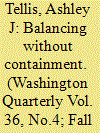

|
|
|
| 3 |
ID:
117813
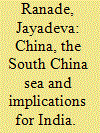

|
|
|
| 4 |
ID:
181170
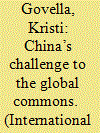

|
|
|
|
|
| Summary/Abstract |
It is often predicted that rising powers such as China will seek to reshape the international order as they gain influence. Drawing on comparative analysis of the maritime and cyber domains, this article argues that China poses a challenge to the global commons because its actions reflect a pragmatic focus on national interest that that disrupts more collaborative conceptions of their governance. However, instead of directly rejecting existing regimes, China has pursued a mixed strategy of complying when these regimes confer benefits and employing contestation or subversion when they conflict with its strategic aims. In particular, China has used contestation and subversion to push for the enclosure of the maritime and cyber domains, extending ideas of sovereignty and territoriality to them to varying extents. While the relatively well-institutionalized nature of maritime governance has limited China’s focus to the application of specific rules in areas where it prioritizes sovereign control, the embryonic status of the cyber regime has enabled China to call into question the fundamental definition of cyberspace as a global common. Subversion has also allowed China to accomplish strategic goals through ‘gray zone’ tactics, resulting in increased conflict below the level of war in both domains.
|
|
|
|
|
|
|
|
|
|
|
|
|
|
|
|
| 5 |
ID:
110283
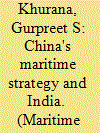

|
|
|
| 6 |
ID:
181172
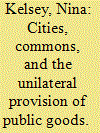

|
|
|
|
|
| Summary/Abstract |
The rise of climate-active municipalities – cities and towns voluntarily creating carbon reduction policy substantially more stringent than their host countries or the international system as a whole – presents a puzzle. Countries, with greater resources and the capacity to create binding agreements to overcome public goods problems, appear to view carbon reduction as an unappealing burden. So why are municipalities, with fewer resources and no way to guarantee a coordinated global effort, so eager to take on the potential disadvantages of stringent carbon reduction? Based on examination of municipal-level carbon reduction activity in Sweden and Portugal, I argue that in fact local-level climate activity represents not a burden but a tool. Municipal climate policy forms the basis for ‘paradiplomacy’ that captures goods for cities, creates international linkages for municipalities, and allows direct participation in setting the terms of global carbon commons policy. The evidence suggests that the nature of the climate commons – incompletely structured from a legal and political perspective, and open to access and intervention by actors at multiple levels – provides unique opportunities for actors to act as makers rather than takers of global governance structure and diplomatic effort in a critical area of emerging international policymaking.
|
|
|
|
|
|
|
|
|
|
|
|
|
|
|
|
| 7 |
ID:
105602
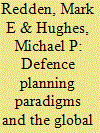

|
|
|
| 8 |
ID:
147480
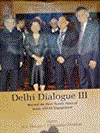

|
|
|
|
|
| Publication |
New Delhi, Manohar Publishers and Distributors, 2012.
|
| Description |
173p.hbk
|
| Standard Number |
9788173049620
|
|
|
|
|
|
|
|
|
|
|
|
Copies: C:1/I:0,R:0,Q:0
Circulation
| Accession# | Call# | Current Location | Status | Policy | Location |
| 058796 | 327.54059/DEV 058796 | Main | On Shelf | General | |
|
|
|
|
| 9 |
ID:
130365


|
|
|
| 10 |
ID:
181171


|
|
|
|
|
| Summary/Abstract |
The Arctic is on fire. Warmed by the world’s soaring greenhouse gases, its ice cap is melting, and it is heating twice as fast as the rest of the planet, deepening the earth’s climate crisis. As its ice thaws, buried resources, trade routes, and new tourist opportunities are suddenly accessible. The borders of the earth’s two largest nuclear rivals, the US and Russia are less than 3 miles apart in the Arctic region and their hostility is growing. Seeking new trade routes and investment opportunities and rapidly rising above its rank as the earth’s third most powerful country, China, has declared itself a ‘near Arctic state’ and is exercising a voice in Arctic affairs. Russia and Arctic NATO members have expanded their military presence in the far North. Despite potential tensions and rapidly melting ice, there is no effective overarching governing regime in the region that can mitigate the climate crisis or manage conflicts were they to arise. Nonetheless, the Arctic remains free of interstate violence. The explanation for the absence of violent conflict cannot be found in traditional International Relations (IR) Theories. Looking below the radar of IR theory and expanding the Human Heritage approach, I show that the region contains a web of overlapping local, regional, national, and pan-Arctic institutions and agreements, built on both traditional and Western knowledge and often steered by indigenous knowledge holders in Arctic governance. This informal web of governing regimes manages Arctic resources to protect human heritage and guard human security. In doing so, it creates a cooperative environment which guides dispute settlement among Arctic states. It is the power of these networks, their normative commitments, and the knowledge that informs them that help to explain the absence of violent interstate conflict in the region.
|
|
|
|
|
|
|
|
|
|
|
|
|
|
|
|
| 11 |
ID:
181169
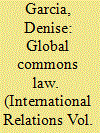

|
|
|
|
|
| Summary/Abstract |
The Global Commons – the high seas and the seabed, Antarctica, the atmosphere (including the ozone layer and the climate system), and outer space – have a distinctive status in international relations because these domains play a vital role in ensuring humankind’s survival, the subsistence of the planet, and the intergenerational custodianship of the human heritage. I call global commons law an ‘uncommon’ realm within international law that is composed of principles and practices that dovetail with treaties aimed at protecting humankind. These laws have an atypical purpose and are characterized by a commonality of interests based on the view that safeguarding these domains is in the interests of developing and developed countries alike, with scientists, activists, and international institutions jointly having a convening power to maintain peace. To elaborate on the impact and implications of the global commons law, I explain three of its functions: guardianship of future generations; creation of a comity for peace and peaceful settlement of disputes; and setting norms as the foundation for peaceful relations. These norms in turn have four key objectives: they provide common ground for peace and cooperation; ensure equity between rich and poor countries; create a forum for equitable burden-sharing; and prevent future harm. The Global Commons face threats – melting ice caps, greenhouse gases, and overfishing – that imperil the survival of humanity. This is then the moment to update and strengthen the mechanisms of global commons law.
|
|
|
|
|
|
|
|
|
|
|
|
|
|
|
|
| 12 |
ID:
113672


|
|
|
|
|
| Publication |
New Delhi, IDSA, 2012.
|
| Description |
xiii, 335p.
|
| Standard Number |
9788182746572
|
|
|
|
|
|
|
|
|
|
|
|
Copies: C:2/I:0,R:0,Q:0
Circulation
| Accession# | Call# | Current Location | Status | Policy | Location |
| 056691 | 355.033054/VEN 056691 | Main | On Shelf | General | |
| 056692 | 355.033054/VEN 056692 | Main | On Shelf | General | |
|
|
|
|
| 13 |
ID:
085341
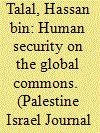

|
|
|
|
|
| Publication |
2008.
|
| Summary/Abstract |
The term "human security" was coined to shift the focus of security from the state to the individual, to emphasize from fear and want.
|
|
|
|
|
|
|
|
|
|
|
|
|
|
|
|
| 14 |
ID:
137764
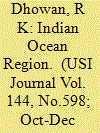

|
|
|
| 15 |
ID:
181166


|
|
|
|
|
| Summary/Abstract |
The global commons – the High Seas, Antarctica, the Atmosphere, and Outer Space – are resource domains outside the authority of states. Historically, the global commons have been practically inaccessible and thus rarely subject to sovereignty claims and international regulations. With technological advances and environmental developments, the global commons have become a key site for international relations (hereinafter IR). In spite of often competing claims from state and non-state actors to these areas, the global commons have remained mainly cooperative. This is not what one would expect from most IR perspectives in a close to anarchical environment and a volatile geopolitical international environment. This Special Issue sets out to address this puzzle by asking: To what extent and why is there little conflict in the global commons? For this purpose, this introduction develops a common framework that distinguishes between three models and corresponding hypotheses of the factors affecting the level of cooperation and conflict in these domains. While two are based on realist and liberal IR perspectives, we draw on constructivism, political theory, and law to develop a third model, called the Human Heritage model. To conclude, this introduction also sums up the findings and discusses their implications for the global commons and IR studies.
|
|
|
|
|
|
|
|
|
|
|
|
|
|
|
|
| 16 |
ID:
145877
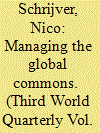

|
|
|
|
|
| Summary/Abstract |
The global commons, comprising the areas and resources beyond the sovereignty of any state, build upon the heritage of Grotius’s idea of mare liberum – an idea that aimed to preserve the freedom of access for the benefit of all. However, the old mare liberum idea digressed into ‘first come, first served’ advantages for industrialised countries. Especially at the initiative of developing countries, it has now been replaced by a new law of international cooperation and protection of natural wealth and resources beyond the limits of national jurisdiction. The global commons have thus served as the laboratory for testing new legal principles and the rights and corollary duties emanating from them. Occasionally path-breaking innovations in regulation have been practised, most notably the imposition of a ban on whaling, penalties for the production and use of ozone-depleting substances and the freezing of claims to sovereignty over Antarctica.
|
|
|
|
|
|
|
|
|
|
|
|
|
|
|
|
| 17 |
ID:
181173
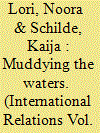

|
|
|
|
|
| Summary/Abstract |
Advanced liberal democratic states interdict migrants on the High Seas global commons. Why have liberal states engaged in this practice over the past four decades? Deterrence and humanitarian rescue explain part of this puzzle, but they are insufficient for understanding the patterns and justifications for migrant interdiction on the High Seas. Tension between states promoting international human rights and circumventing those obligations challenges expectations of liberal state behavior. International relations scholars must incorporate the global commons when explaining state behavior; ungoverned areas create exceptional zones for states to partially suspend their standard operating procedures to execute policies furthering their interests. We argue that liberal states use the regulatory gray zones of the High Seas to ‘muddy the waters’ in order to advance their security interests. States with the highest domestic refugee protections have incentives to circumvent their own obligations, which vary over time with changes to domestic asylum laws.
|
|
|
|
|
|
|
|
|
|
|
|
|
|
|
|
| 18 |
ID:
112166


|
|
|
| 19 |
ID:
129657


|
|
|
| 20 |
ID:
137213
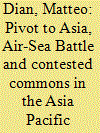

|
|
|
|
|
| Summary/Abstract |
The Pivot towards the Asia Pacific has been a key component of the grand strategy of the Obama administration. Militarily, the main challenge is represented by the Chinese capacity to erode the American ‘command of the commons’.
The United States have been developing a new operational concept, labelled ‘Air-Sea Battle’ (ASB) aimed at maintaining the capacity to project military power even if adversaries are able to deploy a sophisticated anti-access area denial strategy.
The implementation of ASB is likely induce Beijing to respond with a further acceleration of the process ofmodernisation of its armed forces.
|
|
|
|
|
|
|
|
|
|
|
|
|
|
|
|
|
|
|
|
|